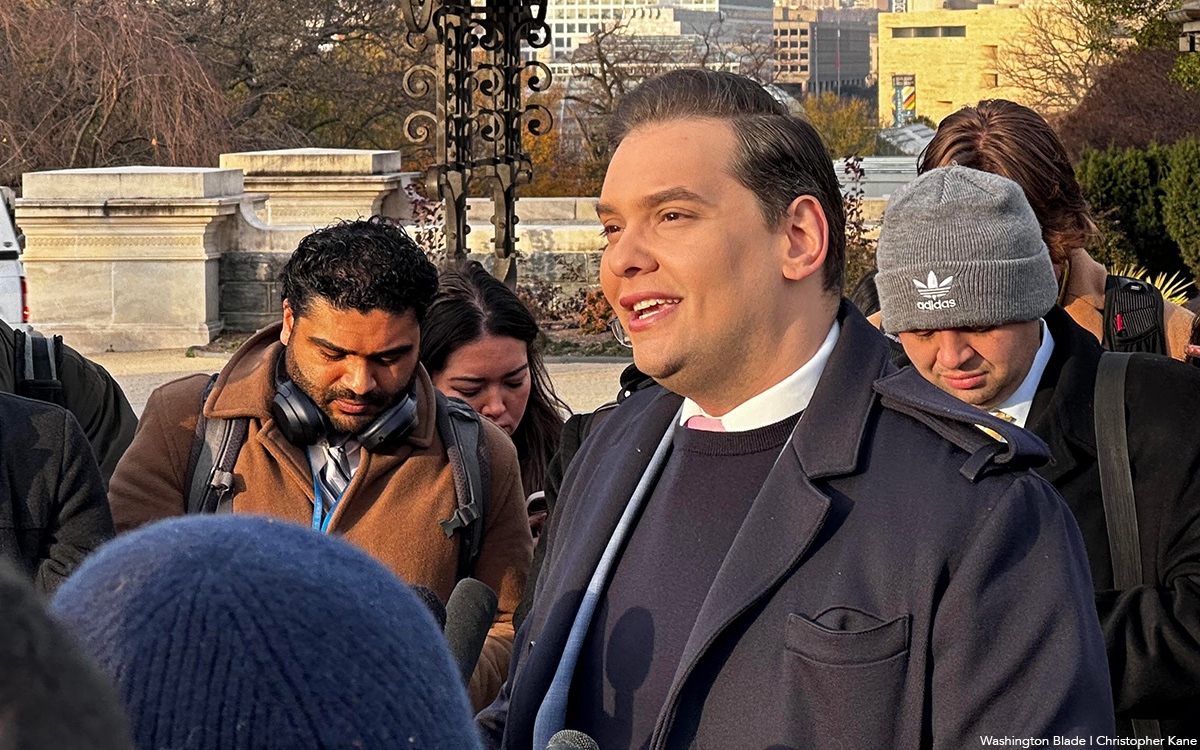ADOPTION, DONOR, SURROGACY
legal services.
Catelyn represents LGBTQ clients in DC, MD & VA
interested in adoption or ART matters.
Modern Family Formation Law Offices
Slattery Law, LLC
240-245-7765
[email protected]

Politics
George Santos sentenced to 87 months in prison for fraud case
Judge: ‘You got elected with your words, most of which were lies.’

Disgraced former Republican congressman George Santos was sentenced to 87 months in prison on Friday, after pleading guilty last year to federal charges of wire fraud and aggravated identity theft.
“Mr. Santos, words have consequences,” said Judge Joanna Seybert of the U.S. District Court for the Eastern District of New York. “You got elected with your words, most of which were lies.”
The first openly gay GOP member of Congress, Santos became a laughing stock after revelations came to light about his extensive history of fabricating and exaggerating details about his life and career.
His colleagues voted in December 2023 to expel him from Congress. An investigation by the U.S. House Ethics Committee found that Santos had used pilfered campaign funds for cosmetic procedures, designer fashion, and OnlyFans.
Federal prosecutors, however, found evidence that “Mr. Santos stole from donors, used his campaign account for personal purchases, inflated his fund-raising numbers, lied about his wealth on congressional documents and committed unemployment fraud,” per the New York Times.
The former congressman told the paper this week that he would not ask for a pardon. Despite Santos’s loyalty to President Donald Trump, the president has made no indication that he would intervene in his legal troubles.
Opinions
Navigating employer-sponsored health insurance, care
One in four trans patients denied coverage for gender-affirming care

Even though 86% of transgender Americans have health insurance, one in four reported being denied coverage for gender-affirming care in the 2015 and 2022 U.S. Transgender surveys. These denials can occur when an insurance plan contains a categorical exclusion of gender-affirming care. It is important to note that transgender employees who receive insurance coverage through their employers are entitled to legal protections.
Employers are responsible for ensuring that the insurance plans they provide do not violate any laws, including anti-discrimination laws. In 1983, the Supreme Court ruled that under Title VII of the Civil Rights Act of 1964, employers are legally required to provide employees with equal pay and benefits, including health insurance. This protection now extends to transgender employees after the Supreme Court’s ruling in Bostock v. Clayton County (2020), which clarified that sex discrimination under Title VII includes gender identity discrimination.
Since Bostock, several transgender employees have successfully sued their employers for discrimination because they were denied coverage of gender-affirming care by their employers’ insurance. While employers can be held liable under Title VII, it remains unclear whether insurance companies will be held liable under Section 1557, the antidiscrimination provision of the Affordable Care Act (ACA), in the future.
Most—if not all—courts have ruled that employers can be held liable for choosing insurance plans with categorical exclusions of gender-affirming care. A categorical exclusion is when an insurance plan has a blanket ban of coverage for certain services. Although discrimination cases generally require proof of intent to discriminate, it is not required of transgender employees because categorical exclusions of gender-affirming care are facially discriminatory (i.e. the policy is explicitly and obviously discriminatory in nature).
In Kadel v. Folwell (2024), the Fourth Circuit court considered the Fourteenth Amendment, Title IX, and ACA claims in a consolidated case considering two state health plans: the State of North Carolina’s insurance plans for teachers and West Virginia’s Medicaid program. The Fourth Circuit court held that it is impossible to ban coverage of gender-affirming care without discriminating against transgender people because (1) gender dysphoria is a legitimate medical diagnosis which requires medically necessary treatment; and (2) the services provided under gender-affirming care are also provided to cisgender patients for other medical diagnoses. In short, there is sufficient evidence of discriminatory intent because categorical exclusions of gender-affirming care are facially discriminatory. Under Kadel, the Fourth Circuit also ruled that a policy does not have to explicitly exclude transgender patients. “Rewording the policies to use a proxy,” like sex changes or sex modification, is still facially discriminatory.
Along a similar vein, in Lange v. Houston County (2024), the Eleventh Circuit court found that the Sheriff’s Office’s categorical exclusion of gender-affirming care was a violation of Title VII. Agreeing with the reasoning in Kadel, the court cited a 1991 Supreme Court Case which ruled that proof of intent to discriminate is not needed for facially discriminatory policies. The court also held Anthem Blue Cross liable because third-party administrators in the Eleventh Circuit (i.e., Alabama, Florida, and Georgia) can be held liable as an employer if they make employment decisions as the authorized agent of an employer. However, this decision is unique to the said jurisdictions, and the liability of third-party administrators/insurance providers remains generally unclear. Moreover, the decision is not final because the court granted an en banc appeal, and a panel of all twelve judges re-heard the case in February 2025. The decision after re-hearing remains to be seen.
Recently, Executive Order 14168 and the EEOC’s motion to dismiss its lawsuit against Harmony Hospitality on behalf of a transgender worker prompted concerns over transgender employees’ ability to bring federal discrimination claims. While such concerns are understandable, there has yet been any mandate prohibiting the EEOC from issuing right to sue to transgender individuals. In other words, even if the EEOC may not investigate and file lawsuits on behalf of transgender individuals, it does not bar private parties from doing so. Ultimately, the executive branch alone does not have the power to make changes to the Constitution or any federal statutes. It is up to the legislatures to amend laws and the Constitution, and courts to interpret and rule on constitutionality.
Protections Against Discrimination by Insurers Under Section 1557 Remain Unclear
While employers can be held liable for categorical exclusions of gender-affirming care, employees may be less likely to find relief for legal claims against insurers regarding discrimination on the basis of gender identity. Since Bostock, courts have found insurers liable for denying coverage of gender affirming care under Section 1557 of the ACA, extending sex discrimination to include gender identity. Recent litigation surrounding Section 1557 and the new presidential administration may precede a change in this trend.
In May 2024, the Biden administration issued a final rule implementing Section 1557.It reversed the rule put forth by the Trump administration four years prior, which had revised the Obama administration’s interpretation of the statute. The Biden administration’s final rule defined sex discrimination to include discrimination on the basis of gender identity and sexual orientation. Additionally, under the new rule, a wider swath of insurers and third-party administrators that receive federal financial assistance would be subject to Section 1557.
However, in July 2024, a Mississippi District judge granted a nationwide injunction preventing the Department of Health and Human Services from enforcing the final rule’s prohibition of sex discrimination with respect to gender identity. Additionally, executive orders during the early days of the Trump administration, and guidance from the Department of Health and Human Services that followed, rescinded wide swaths of Biden-era guidance extending sex discrimination protections to include discrimination based on gender identity. It is not yet clear how the new administration’s position on Section 1557 will impact courts’ decision-making regarding insurer liability and the extent of sex discrimination provisions in relation to gender identity going forward.
As the recent history of Section 1557 demonstrates, executive actions may influence the implementation of statutory antidiscrimination provisions, but do not change the law itself. While employers continue to face liability for discrimination towards employees seeking insurance coverage of gender-affirming care under Title VII, some protections remain on less certain ground as the United States enters a new presidential administration.
Ting Cheung, Luke Lamberti, and Neha Sharma are with Sanford Heisler Sharp McKnight.
Theater
Timely comedy ‘Fake It’ focuses on Native American themes
Arena Stage production features two out actors

‘Fake It Until You Make It’
Through May 4
Arena Stage, 1101 Sixth St., S.W.
Tickets start at $59
Arenastage.org
A farce requires teamwork. And Larissa FastHorse’s “Fake It Until You Make It” now at Arena Stage is no exception.
The timely comedy focuses on Native American nonprofits fractiously housed in a shared space. Friction rises when rivals River (Amy Brenneman), a white woman operating in the Indigenous world, goes up against the more authentic Wynona (Shyla Lefner) to win a lucrative Native-funded grant.
While Brenneman (best known for TV’s Judging Amy) is undeniably a big draw, it takes a group collaboration to hit marks, land jokes, and pull off the well-executed physical comedy including all those carefully timed door slams.
As members of the six-person “Fake It” cast, Brandon Delsid and Eric Stanton Betts, both out actors of partly indigenous ancestry, contribute to the mayhem. Respectively, Delsid and Betts play Krys and Mark, a pair of two-spirited Native Americans who meet farcically cute and enjoy one of the play’s more satisfying arcs.
For Krys, every attractive man is a potential next fling, but when Mark, handsome and relatively reserved, arrives on the scene, it’s something entirely different.
Both onstage and sometimes off, Betts plays the straight man to Delsid’s waggishness. But when it comes down to real life business, the friends are on the same page: not only are the L.A.-based, up-and-coming actors intensely serious about their film and stage careers, but they’re also particularly engaged in the themes of Indigenous People found in “Fake It.”
On a recent Wednesday following a matinee and an audience talkback, they were ready for a phone interview.
In establishing whose voice was whose, Delsid clarified with “I’m the one who sounds a little like a Valley girl.”
WASHINGTON BLADE: Brandon, you’ve been with the show since its early work-shopping days in 2022 and through its debut in Los Angeles and now Washington. Have things evolved?
BRANDON DELSID: Definitely. I’ve grown up in the last couple of years and so has my character; it’s hard to know where I end and Kry begins. There’s been a real melding.
Eric and I are both queer, and to get to play these roles that are so human, imperfect, sexy, and interesting is really joyful.
As queer artists you don’t always get the chance to do work like this. So many stories are queer trauma, which is incredibly important, but it’s liberating to feel joy and ride it off into the sunset, which, without revealing too much, is kind of what we get to do.
BLADE: There’s some race shifting in “Fake It” particularly with regard to “pretendian” (a pejorative term describing a person who has falsely claimed Indigenous status).
ERIC STANTON BETTS: The last few years I’ve been on a journey with my cultural identity and place in the world. I’m a mixed BIPOC artist, my dad is Black and Native American by way of the Cherokee tribe and my mom is white.
Since 2020, I’ve tried to figure out where I belong in this cultural history that I haven’t had a tie to throughout my life; it’s gratifying to find my way back to my indigeneity and be welcomed.
In the play, race shifting is introduced through farce. But it’s never in a disrespectful way; it’s never mocked or done in a way to take away from others. The playwright parallels race shifting with gender fluidity.
DELSID: But in life, there are people posing as Indigenous, actively taking grants, and the play goes there, we don’t hold back. Larissa, our playwright, has made it clear that she’s not trying to figure it out for us. With that in mind, we hope people leave the theater interested and curious to learn more.
BLADE: Mark arrives kind of the middle of some crazy drama, bringing along a jolt of romance.
BETTS: Yeah, when I show up, we’re all sort of shot out of a cannon, struggling to keep up with the initial lie.
DESLID: A very gay cannon.
BLADE: What’s up next for you two?
BETTS: Both Brandon and I are up for the same part in a TV pilot, so one of us may be getting some very good news. I also have a Tyler Perry film coming out soon [he plays a model, not an unfamiliar gig for Betts].
DELSID: Coming up, I have a recurring part on HBO’s “The Rehearsal,” and a supporting part in “June and John,” a John Besson film. But doing “Fake It Until You Make It” in L.A. and now D.C. has been a special time in our lives. It’s 23/7 togetherness. There’s that hour for sleep.
-

 Federal Government3 days ago
Federal Government3 days agoHHS to retire 988 crisis lifeline for LGBTQ youth
-

 Opinions3 days ago
Opinions3 days agoDavid Hogg’s arrogant, self-indulgent stunt
-

 District of Columbia2 days ago
District of Columbia2 days agoD.C. police seek help in identifying suspect in anti-gay threats case
-

 Virginia3 days ago
Virginia3 days agoGay talk show host wins GOP nom for Va. lieutenant guv






